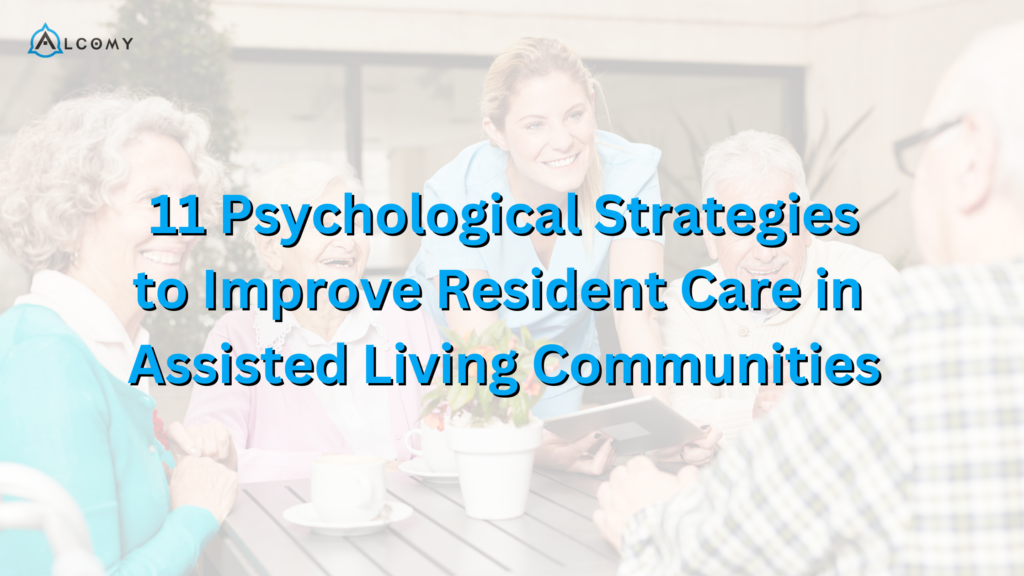Simple, science-informed strategies to support mental health, staff morale, and family satisfaction
Running an assisted living community involves more than meeting physical needs and managing logistics. Exceptional communities also prioritize emotional wellness, mental health, and resident engagement—because these are the factors that truly set great care environments apart.
Here are 11 actionable strategies, rooted in psychology, that can:
- Improve resident well-being
- Boost staff retention
- Strengthen family relationships
- Create a more emotionally healthy and connected community
Whether serving as a community owner, administrator, caregiver, or care coordinator, these insights are essential for building a thriving assisted living operation.
1. Promote a Sense of Autonomy
Why: When residents feel in control of daily choices—no matter how small—they maintain dignity, independence, and higher self-esteem.
What to Do: Offer choices around meals, bathing times, or daily activities. Empower staff to make more day-to-day decisions to increase engagement and ownership.
2. Reduce Loneliness and Social Isolation
Why: Social isolation is a major risk factor for depression, anxiety, and cognitive decline in seniors. Connection is as essential as medication.
What to Do: Schedule structured social time daily. Use peer pairings, staff-resident games, and community meals to promote organic connection.
3. Encourage Mental Stimulation
Why: Mentally engaging activities improve mood, slow cognitive decline, and provide a sense of purpose and accomplishment.
What to Do: Incorporate music, memory games, storytelling circles, or resident-led mini classes. Stimulate both mind and spirit.
4. Make Room for Emotional Adjustment
Why: Transitioning into assisted living often comes with grief, anxiety, or identity loss. Addressing those emotions improves adaptation and satisfaction.
What to Do: Assign new residents a “welcome buddy.” Normalize emotional conversations. Build in time to check on how residents feel—not just how they function.
5. Strengthen Staff-Resident Relationships
Why: Familiar, trusting caregiver relationships reduce behavioral issues and improve quality of care.
What to Do: Keep care assignments consistent. Encourage staff to remember key personal details (e.g., favorite sports team, grandchildren’s names). A few extra minutes of meaningful conversation each day helps build lasting trust.
6. Use Food to Support Mental and Emotional Wellness
Why: Food affects more than just physical health—it can influence mood, memory, and emotional stability. Shared meals also build community.
What to Do: Serve colorful, whole-food-based meals rich in omega-3s, antioxidants, and B-vitamins. Create a warm, social dining environment. Offer residents input on menus or meal prep when possible.
7. Practice Trauma-Informed Care
Why: Many residents have experienced trauma or long-term grief. Without awareness, care interactions can unintentionally re-trigger stress.
What to Do: Avoid abrupt commands or loud noises. Train staff in the core principles of trauma-informed care: safety, trust, choice, and collaboration.
8. Create a Supportive Environment
Why: Lighting, noise, layout, and color all affect mental health, behavior, and sleep. Calm environments support calmer people.
What to Do: Use warm lighting, reduce ambient noise, and simplify signage. Add natural elements like plants or artwork connected to residents’ pasts.
9. Foster Purpose and Contribution
Why: Purpose is linked to longer life, better health, and emotional resilience. Even small roles can have a big impact.
What to Do: Invite residents to help fold linens, lead parts of group activities, or mentor newer staff. Consider launching a “resident legacy” program for storytelling or memory books.
10. Support Staff Mental Health and Retention
Why: Burned-out caregivers lead to higher turnover and lower quality care. Emotionally healthy staff contribute to emotionally healthier residents.
What to Do: Offer mental health days, peer debriefs, and leadership check-ins. Create open space where staff feel heard and supported.
11. Include and Empower Families
Why: Families want to be partners, not just visitors. When families feel confident and included, tensions drop and trust rises.
What to Do: Communicate proactively. Host quarterly family meetings. Share updates beyond the clinical—celebrate resident wins and personal milestones.
💡 Final Thought
Psychology belongs at the heart of every assisted living community. By nurturing emotional safety, autonomy, purpose, and connection, it’s possible to build a place where residents thrive, caregivers stay longer, and families feel truly at home.


